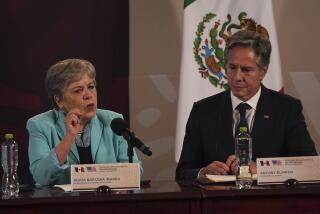U.S.-Mexico Trade Pact Foes Assail Environmental Study
SAN DIEGO — Opponents of the U.S.-Mexico free-trade agreement on Friday lambasted the Bush Administration’s review of the agreement’s environmental impacts, calling a study released this week skewed and incomplete.
The 199-page “Review of U.S.-Mexico Environmental Issues,” while conceding that increased trade and development could worsen existing pollution problems along the 1,550-mile border, presented a predominantly optimistic view, claiming that economic growth could help raise the funds needed to solve those problems.
“Completion and implementation of the (agreement) . . . is likely to strengthen the two countries’ commitment to cross-border environmental cooperation, while allowing the Mexican government to obtain additional resources for environmental protection and infrastructure development,” the review said.
U.S. Trade Representative Carla A. Hills said in a statement: “The elimination of trade and investment barriers through a (free-trade agreement) can have important environmental benefits. Economic growth can generate resources to address longstanding environmental problems.”
Environmental Protection Agency Administrator William Reilly was similarly optimistic.
“This Administration is already working with Mexico on concrete action to improve environmental conditions along the border,” he said in a statement. “No one could ask for a stronger, more committed ally in this endeavor than President Salinas of Mexico.”
Critics noted, however, that the review, conducted by an interagency task force coordinated by the Office of the U.S. Trade Representative, did not specify how much those solutions would cost or where those resources would come from.
“They act as if we now have a new secret remedy here called cooperation that will solve all these problems,” said Michael McCloskey, chairman of the Sierra Club. “But is there anything to make any of this happen? Any enforcement? Any teeth? Any money?”
Craig Merrilees, director of the Fair Trade Campaign, a consortium of consumer, labor and environmental groups on both sides of the border that oppose the trade pact, agreed.
“The report pretends that this will allow Mexico to have a tough system of enforcement and environmental regulation,” he said. “But there’s nothing in the plan other than good intentions to make that happen.”
More to Read
Sign up for Essential California
The most important California stories and recommendations in your inbox every morning.
You may occasionally receive promotional content from the Los Angeles Times.










